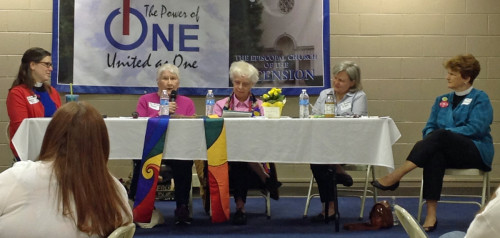ENS:
They were compared to witches and called names by male priests that you would least expect to hear coming from the mouths of men of the cloth. Nearly 41 years after becoming two of the first women priests in The Episcopal Church, they don’t regret their decision and recognize that despite much progress, there is still a need to fight for women’s proper role in the church.
The Rev. Alison Cheek, the first woman to publicly preside over an Episcopal Church Eucharist in the United States, and the Rev. Carter Heyward, a prolific author on feminist theology and retired professor at Episcopal Divinity School, were part of an April 11 symposium at theEpiscopal Church of the Ascension in Knoxville, Tennessee, sponsored by East Tennessee Episcopal Church Women.
Cheek and Heyward were two of the Philadelphia 11 who were ordained in Philadelphia by three retired bishops in July 1974 causing uproar in the national church. Although women’s ordination was not specifically prohibited, by practice it had never been allowed. Darlene O’Dell, author of The Story of the Philadelphia Eleven, who also participated in the symposium, said study of the issue had gone on “for over 50 years and promised to go on into oblivion” if action hadn’t been taken.
Cheek, who turned 88 the day of the symposium, said she had entered Virginia Theological Seminary at the urging of her parish priest because she had asked him so many questions. While in seminary Cheek felt the call to priesthood, but let it pass because she knew it wasn’t a possibility. With four young children at home, the Australia native took six years to complete her degree, and then returned to her parish as a pastoral counselor. Her rector then encouraged her to enter the deacon ordination process. She became the first female deacon in the South in 1972.
There is still much to do in bringing about the proper role of women in the Church.
Moving forward, Heyward said, women in the church should follow four principles put forth by another member of Philadelphia 11, the late Suzanne Hiatt, who is widely credited with engineering the 1974 ordinations. Heyward co-edited a book of Hiatt’s writings, The Spirit of the Lord is upon Me.
The four principles are women should seek the primary role in bringing change about, learn how institutions work that they wish to change, be united in struggling together and avoid horizontal violence, and remember that the church needs them more than they need the church.

